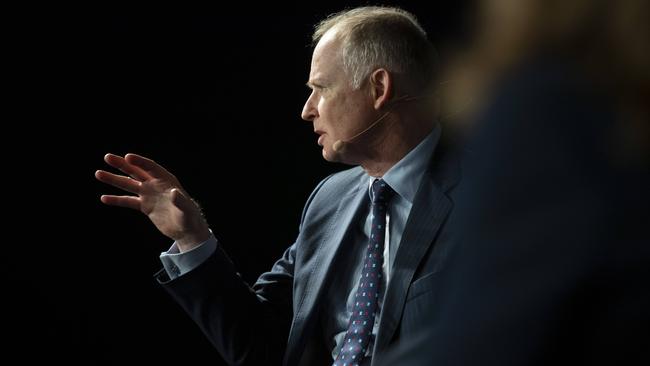BHP finance boss David Lamont says industrial relations reforms will hit dividends
BHP says it will need to strip about $1.5bn a year from its dividend payments if the federal government’s industrial relations reforms go ahead.

BHP says it will need to strip about $1.5bn a year from its dividend payments if the federal government’s industrial relations reforms go ahead, as BHP chief executive Mike Henry doubled down on the company’s decision to avoid the lithium, rare earths and hydrogen race.
Speaking at a retail shareholder question and answer session on Monday, Mr Henry confirmed BHP had not changed its mind on lithium, despite the extraordinary profits the commodity has delivered to Australian miners this year, saying BHP did not see enough long-term margin in the metal to make it worth entering the space.
Mr Henry said BHP did not have the internal skill set to enter lithium production from brine sources in South America, and did not see long-term margins from lithium.
“We also have a belief that the lithium is so plentiful around the world that over time you see a lot more lithium production being brought on – and that the industry structure is such that you have a relatively flat cost curve, meaning that the margin opportunity offered up by the deal is less than it will be for some other commodities that we‘ve chosen to invest in,” he said.
Mr Henry said the company had little interest in rare earths production as the market was too small, and believed expanding to hydrogen would be a distraction for management, away from BHP’s core strategy of focusing on copper, potash, iron ore and high-grade coking coal, along with nickel.
“We want to ensure that any investment that we’re making has to be well aligned with BHPs existing capabilities, or has to be something where we believe that we can create those capabilities and it’s worth us doing so over time,” he said.
“So something like hydrogen, for example, is more of a kind of a chemicals processing effort, and it sits outside of BHP’s capabilities. That’s one of the reasons why we wouldn’t pursue hydrogen.”

Speaking on the same retail shareholder question session, BHP chief financial officer David Lamont warned retail shareholders the federal government’s new industrial relations legislation would cut BHP dividends by about 30c a share if passed unchanged – or about $1.5bn in total – as the mining giant ramps up its attacks on the Same Job, Same Pay legislation.
Mr Lamont said BHP believed its initial estimate that the reforms would cost the company about $1.3bn a year in additional costs was “light on” and said the workplace changes would flow through directly to the company’s global shareholder base.
BHP first released that $1.3bn impact figure in May, before the legislation had been finalised, and Employment and Workplace Relations Minister Tony Burke has repeatedly questioned the basis of BHP’s costings.
Mr Burke argues the legislation merely closes a loophole used by some employers – including BHP – to undercut wages in enterprise agreements.
Mr Lamont told BHP’s retail shareholders the impact would flow directly through to the company’s earnings and dividends – even though the company has not finished its analysis of the industrial relations package.
“We need to continue to evaluate exactly what the legislation will be. But let me be very clear, this will have a direct impact to our shareholders. That $1.3bn will come directly off our earnings for the year, that will then flow directly to dividends. We estimate that to be about 30c on a dividend payout,” he said.
BHP will pay a $1.25 a share dividend to its local shareholders on September 28, on top of a $1.36 interim dividend paid in April.
“That will impact the 17 million Australians that hold BHP shares either directly or through their retirement savings. That’s a direct impact flowing through. Another way to look at it, that $1.3bn is equivalent to around 5000 jobs in BHP. So a direct impact to all of our shareholders, not only in the dividends but also off the earnings of the organisation,” he said.



To join the conversation, please log in. Don't have an account? Register
Join the conversation, you are commenting as Logout